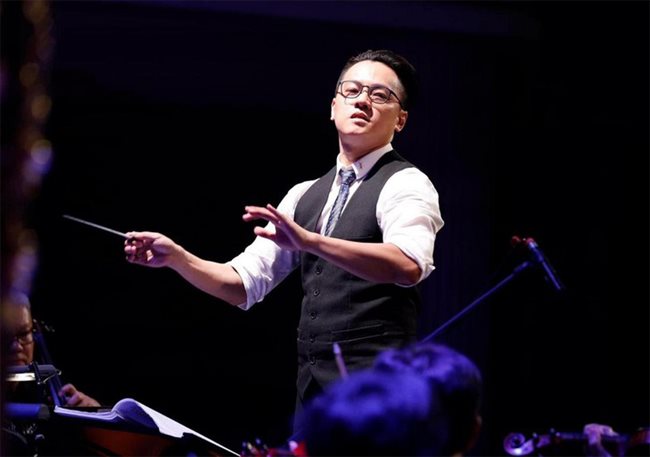HCMC – This is extraordinary! September 10 is the Mid-Autumn Festival, or Full-Moon Festival. It is also the opening day of HBSO’s eight-day-long Autumn Melodies celebration, which only happens every second year. It also, conveniently for concert-goers, happens to be a Saturday, and, most sensational of all, because the event this year is being presented under the auspices of the HCMC People’s Committee, all the seven events will be free of charge, in the Saigon Opera House.
There will be an event every day except September 12; the Opening Concert on September 10 promises to be an especially splendid affair.
It begins with seven items of Vietnamese music, mostly well-known songs sung by eminent soloists, though some only for Chorus and Orchestra.
The first of these Vietnamese items is Lanh Tu Ca [the leader’ s song], presented by the HBSO chorus and orchestra. This is followed by Giai Dieu To Quoc [homeland melody] performed by the same forces.
Next comes To Quoc Goi Ten Minh [the motherland calls my name] featuring Ta Minh Tam, then Pham Duyen Huyen singing Ho Chi Minh Dep Nhat Ten Nguoi [Ho Chi Minh – his name most beautiful].
All the solo vocalists will combine for Thanh Pho Toi Yeu [the city I love], while an alto saxophone played by Nguyen Tuan Loc replaces the vocalists in Khat Vong [full of thirst and hope].
This section of the program concludes with the massed forces of all the soloists, the Chorus and Orchestra in Tieng Hat Tu Thanh Pho Mang Ten Nguoi [singing from the city of his name].
This Opening Concert begins early, at 7.30 p.m., presumably there will be official speeches before the music begins.
The highly popular and well-known songs in Vietnamese will be followed by eight items, equally well-known, from the Western tradition.
This second section begins with Verdi, the Introduction and Barcarolle from his early opera I Due Foscari (the two Foscari brothers). Dating from 1844, it is a story based on the English poet George Gordon Lord Byron’s poem. It’s set in Medieval Venice and a “barcarolle” is a song sung by gondoliers. They appear in the third act, backed by the Chorus.
Next comes the super-famous Nessun Dorma [nobody shall sleep] from Puccini’s final opera, Turandot. It’s set in China, and a nobleman, Calaf, from a distant country wants to marry the icy princess Turandot. She has decreed, however, that any suitors must answer three riddles, with death following if they fail. Calaf gets the answers right but offers Turandot oner way out – if anyone can discover his name before dawn he will accept death. Nessun Dorma is an aria of defiance, beginning with a mocking repetition of Turandot’s words.
Puccini didn’t live himself to complete this opera but died in a Belgian clinic instead. In Saigon tenor Pham Trang will be Calaf.
Next comes a Mozart item, one of the Queen of the Night’s arias from The Magic Flute. The soloist will be soprano Pham Khanh Ngoc.
Georgy Svindov (1915 to 1998) was a successful Soviet composer. We will hear the Valse (waltz) “Snowstorm”, written in 1935. There are no vocalists involved.
Then comes Largo al Factotum from Rossini’s comic opera The Barber of Seville. Baritone Dao Mac will sing Figaro, the barber, complaining about his fate as a “factotum”, or all-purpose servant.
Ah, mes amis [Oh my friends] is a Donizetti aria that has the tenor soloist repeat eight high C’s in a row. Guest artist tenor Yury Rostotsky will attempt this feat in Saigon. Donizetti wrote this opera in French, despite being Italian, because he was living in Paris at the time,’Rostotsky will remain on stage to sing the famous O Solo Mio [Oh my sun], written in Naples in 1898.
Verdi returns with the Brindisi [drinking song] from Act One of La Traviata, and the concert ends with a foretaste of the next night’s Carmina Burana in the form of the opening (and closing) hymn to Fortuna, known to many as a theme from the X Factor.
The two conductors will be Le Ha My and Tran Nhat Minh.
With all tickets free, this concert should be full well before the starting time of 7.30 p.m.









